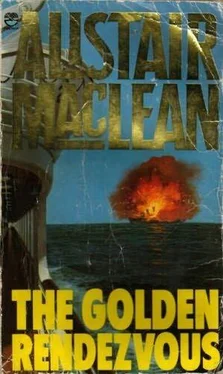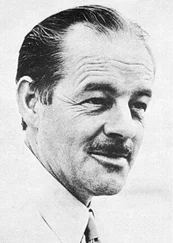“Sunstroke, eh?” her face held genuine concern. “And lack of sleep. You should be in bed. Captain Bullen, I’m afraid you’re overworking this young man.”
“That’s what I keep telling the captain, ma’am,” I said, “but he doesn’t pay any attention to me.”
Captain Bullen smiled briefly and rose to his feet. His eyes, as they roved slowly over the room, held the expression of a man who wanted both attention and quiet: such was the personality of the man that he got it in three seconds flat.
“Ladies and gentlemen,” he began. The Duke of Hartwell regarded the tablecloth with that smell-of-bad-fish expression he reserved for tenants wanting a cut in rent and merchant navy captains who forgot to preface public addresses with the words “Your Grace.”
“I am most distressed,” the captain went on, “as I am sure you are all distressed, by the events of the past twelve hours. That we should lose our chief wireless officer through death by natural causes is, God knows, bad enough, but that our chief steward should vanish the same evening-54 well, in thirty six years at sea I have never known anything like it. “What happened to chief steward Benson we cannot say with any certainty, but I can hazard a guess and at the same time issue a warning. There are literally hundreds of cases of men vanishing overboard at night, and I have little doubt but that Benson’s death is due to the same reason which probably accounts for 99 per cent of all the other cases. Even on the most experienced sailors the effect of leaning over the rail at night and watching the black water passing below has a weirdly hypnotic effect. I think it’s something akin to the vertigo that affects a great number of people, people who are convinced that if they go near, say, the parapet of a high building, some strange force will make them topple over, no matter what their conscious minds may say. Only, with leaning over the rails of a ship, there is no fear. Just a gradual mesmerism. A man just leans further and further over until his centre of gravity is suddenly displaced. And then he is gone.”
As an alibi or explanation for Benson’s disappearance it was as good as any; as a general statement it was also unfortunately true.
“And so, ladies and gentlemen, I would counsel you all, most strongly, never to approach the ship’s rails at night unless you are accompanied by someone else. I would be most grateful if you would all bear that strongly in mind.”
I looked round the passengers as far as my stiff neck would allow. They would bear it in mind all right. From now on wild horses wouldn’t drag them near the Campari’s rails at night.
“But,” Bullen went on emphatically, “it will help neither of those unfortunate men and only do ourselves a great disservice if we allow ourselves to brood over those things. I cannot ask you to dismiss those deaths from your minds at once, but I can ask you not to dwell on them. On a ship, as elsewhere, life must go on especially, I might say, on a ship. You are aboard the Campari to enjoy the cruise; we are aboard to help you enjoy it. I would be most grateful if you would give us your every assistance to get shipboard life back to normal as soon as possible.”
There was a subdued murmur of agreement, then Julius Beresford, rising from his seat beside the captain, was on his feet.
“Do you mind if I say a few words, sir?” he could have bought the Blue Mail Line without even denting his bank balance, but still he asked permission to speak and called old Bullen sir.
“Certainly, Mr. Beresford.”
“It’s just this.” Julius Beresford had addressed too many board meetings to be anything other than completely at ease when speaking to people, no matter how many million dollars they represented. “I agree, and agree completely, with everything our captain has said. Captain Bullen has said that he and his crew have a job to do and that that job is to look after the every comfort and convenience of his passengers. Under the rather sad circumstances in which we have to meet this morning, I think that we, the passengers, have also a job to do — to make things as easy as possible for the captain, officers, and crew and to help them to bring things back to normal as soon as possible. “I’d like to start the ball rolling by asking you all to be my guests for a brief period this evening. To-day, ladies and gentlemen, my wife celebrates her birthday.” He smiled down at Mrs. Beresford.
“She forgets exactly which one. I cannot invite you to a birthday dinner, for what could I offer you as a special meal that Antoine and Henriques do not give us every night of the week? But Mrs. Beresford and I should be grateful if you would be our guests at a cocktail party this evening. Seven forty-five. In the drawing room. Thank you.”
I looked round the table. Miguel Carreras was nodding slightly, as if in grave acceptance and appreciation of Beresford’s underlying motives. Miss Harrbride was beaming with pleasure: she doted on the Beresfords, not for their money, but for the fact that they were one of the very oldest American families, with goodness only knew how many generations behind them. Mr. Greenstreet, her husband, studied the tablecloth in his usual intent fashion. And Tony Carreras, more impossibly handsome than ever, leaned back in his chair and regarded Julius Beresford with a slightly amused, speculative interest. Or maybe it was Susan Beresford he was looking at. I was more certain than ever that there was something wrong with Tony Carreras’ eyes; it was almost impossible to tell in what direction they were looking. He caught my glance and smiled.
“You’ll be there, Mr. Carter?” he had that relaxed, easygoing manner that comes from having a bank account bursting at the seams but none of the usual hint of condescension: Tony Carreras I could get to like.
Briefly only, I’m afraid. I have to go on watch at eight o’clock this evening.” I smiled. “If you’re still at it at midnight, I’ll join you.” Like hell I’d join them: at midnight I’d be showing the Nassau police over the ship. “And I’m afraid you’ll have to excuse me now. I have to relieve the officer of the watch.”
I made my excuses and left. On the deck I almost bumped into a sandy-haired young seaman, Whitehead, who usually shared my watches on the bridge in his capacity as engine room telegraphist, lookout, bridge messenger, and coffee maker.
“What are you doing here?” I asked sharply. With young Dexter on watch I wanted as many sharp eyes and quick minds as possible round him: Whitehead had both. “You know you’re not to leave the bridge in my absence?”
“Sorry, sir. But Ferguson sent me.” Ferguson was the quartermaster on the forenoon watch. “We’ve missed the last two course alterations and he’s getting pretty worried about it.” We were bringing round three degrees to the north every fifteen minutes to get on a north by west course, but slowly, so as not to excite anyone.”
“Why come and bother me about it?” I said irritably. “Fourth Officer Dexter is perfectly capable of handling those matters.” He wasn’t, but one of the drawbacks of being a fellow officer of Dexter was that you were forced to lie like fury to maintain an outward appearance of solidarity.
“Yes, sir. But he’s not there, Mr. Carter. He left the bridge about twenty minutes ago and he hasn’t come back yet.” I pushed violently past Whitehead, knocking him to one side, and made for the bridge at a dead run, three steps at a time up the companionways. Rounding one corner, I caught a glimpse of Whitehead staring up after me with a most peculiar expression on his face. He probably thought I had gone mad.
[Wednesday 8:45 a.m. — 3:30 p.m.]
Ferguson, a tall, swarthy, saturnine cockney with no hair left to speak of, glanced round as I burst through the doorway from the starboard wing of the bridge into the wheelhouse. His face showed his relief.
Читать дальше
Конец ознакомительного отрывка
Купить книгу












